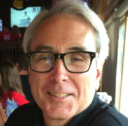“When your heart is breaking for someone who is broken, but your words can’t reach them and your love can’t save them, ask the angels to go where you cannot; to whisper into their heart what their ears cannot hear; we love you, we’re here, you’re not alone.”
When Vickie and I returned to Barrington on Wednesday, April 26, we went immediately to be with our friend and their families who were sitting vigil for their husband/father. They had begun the climb for Machu Picchu in Peru when her husband suffered a cerebral hemorrhage. After surgery and a time of hopeful recovery in Lima, he eventually was flown back to Rush-Presbyterian Hospital in Chicago where his family was told that he had no chance of recovery. He was moved to hospice care where he has been slowing dying for over a week as I write this on Wednesday, May 3. They are dear friends. We’ve been visiting regularly.
Few experiences in life strip us down to the essentials more than sitting vigil with someone who is dying. Existence becomes razor focused.  All that seemed to matter a few days ago becomes window dressing on the essentials of human existence: breath, love, family, friends, time, suffering and more. Work pressure disappears into the rhythm of keeping watch day and night. Matters of existential urgency are consumed by the spirit of eternity. Those in vigil become acutely aware of life, hoping deep in their souls that the loved one will somehow continue indefinitely while facing into the reality of death and the knowledge that they/we can’t have it both ways.
All that seemed to matter a few days ago becomes window dressing on the essentials of human existence: breath, love, family, friends, time, suffering and more. Work pressure disappears into the rhythm of keeping watch day and night. Matters of existential urgency are consumed by the spirit of eternity. Those in vigil become acutely aware of life, hoping deep in their souls that the loved one will somehow continue indefinitely while facing into the reality of death and the knowledge that they/we can’t have it both ways.
Behavior changes unfold. Showers aren’t needed everyday. Clothes become “lived in.” Chairs become beds and two hours of sleep a luxury. Surrounded by a community of family and friends, food appears randomly and abundantly. There is a story of one friend who brought six vanilla lattes because she didn’t know what else to do.
No pattern governs life except the reality and comfort of the dying. We might rarely hold the hand, look a loved one in the face, and sit still when all is well, but in vigil these moments are gifts as the human soul seeks to record all that is unfolding in order to remember forever; seeks to forge a connection that will sustain the surviving loved one, because, as Jesus said before his own death, “where I’m going you cannot come.” And each moment encapsulates the dilemma between suffering and freedom. Life has an intrinsic and focused purpose. Life has meaning. Life has value. Everyone counts in a vigil. Awareness becomes a sensitivity to each silent nuance of the environment. Time seems to slow down and so do those of us who surrender to the vigil. For some, there is prayer of words. For some, there is prayer of actions. For some there is no conscious prayer. For some God is a comfort. For others God is a question mark. For some God is irrelevant. But I wonder: God is love and where true love is found, there is God. Hover above a vigil of loved ones where love is present and God is there. God doesn’t need recognition. God simply shows up in a myriad of undisclosed ways including a peaceful death. But then, that’s my belief and comfort.
The Rev. Al Johnson is Canon for Congregational Vitality and Innovation for the Diocese of Northwestern Pennsylvania.

